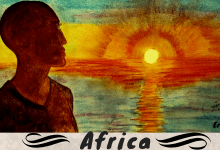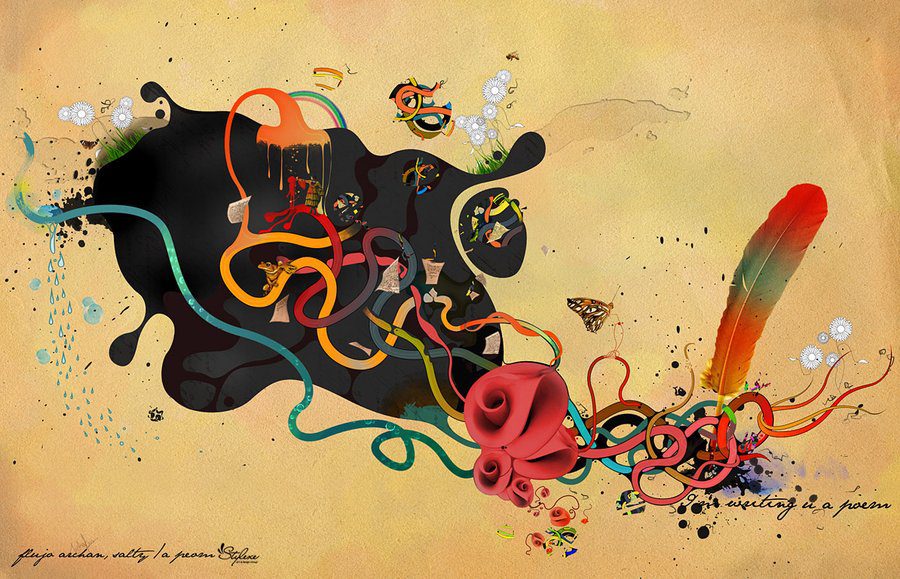An intriguing story by Ismail that describes a day in the life of a poet. A Different Truths exclusive for the Special Feature on Africa.

I’ve got to. Got to write it. Yes; the poem. It’s been on my mind for sometime: for quite a long time. I haven’t got any idea on how to go about it— I don’t have a theme, the story to soliloquise on, so to say; but I know I’ve to write it. Could this be it?
What then happens to a poem postponed? Does it fly off Like confetti in a storm? Or lingers on like a gore And then vanishes? Does it reek like bad breath? Or pines and dusts over Like an ancient coat of paint? Perhaps it just snaps Like a strained rope Certainly does not die: Does it?
As I finished reading it for the third time, the event that provoked it, (it couldn’t be an inspiration, certainly) all came back to me as if it happened yesterday. The event of that mysterious September day. I still could remember: I could hear myself reading it aloud…
* * *
Amidst a thunder of applause, I could proudly hear my name being called out by the chairman of the occasion on whose head rested heavily the onus of calling out participants’ names. My fiends shouted almost in chorus to sound above the deluge of cheering. It was the poets’ day. A day set to examine the students’ poetic thoughts through the invited appreciation of both their teachers and friends.
At the front, I sat consumed in my own thoughts. The unfolding scene scared me; I began to ask myself whether my idea of letting the university pass through me was a right one.
Ever since I came to the theatre, with my ‘chaperon’ following me with the dexterity of an assiduous bodyguard, I was seized by the strange presentment that all was not going to be well. But all the same the whistling and cheering lifted up my confidence in the face of despair. I wiped off trickles of perspiration from my tired, timid-looking face.
For the first time at the university, a day had been dedicated to the recitation of poetry. And I was in the contest for any of the prizes, (or is paying the price?) in the Literary Club organised competition. Even before then, I had a couple of verses published in the local paper. But I had no poetry recitation experience, and apparently no strength to weather the poetic storm.
You’ve got to try, it’s better than saying I can’t; besides, your chances are bright”, chipped in my chaperon.
“Would the next participant come forward for his reading?” the chairman’s word rang in my ears like a gunshot. My heart pounded heavily, I thought it would burst out—it nearly did. My fear was visible, written boldly all over my face. But I resolved there was no way to back off now. It was too late.
Shaking and trembling as if I was disoriented; I managed to limp awkwardly to the dais. My singsong voice betrayed my emotion, and the microphone attested to that; I had to let it go. I couldn’t hear anything, except my rumblings gyrating in the air. Few friends managed to find their hands, while some miserly spared half-suppressed smiles.
After what seemed an eternity, I trudged back to my seat to assess my chances; if there were any left. My hope had since developed wings. A voice kept asking, “what if you lost?” Waves of terrifying questions kept me uneasy. What about all those countless hours put into this so-called intellectual venture? I remembered the good image (and respect?) I was able to muster-up from friends, especially of kindred spirits; at long last they would realise their folly of believing in me.
“Believe me, you’ll excel, you’ve our support; the poet will indeed rise,” admirers had boasted in one of our daily discourses. My chances were clear, so they made me believe.
It was “judgement day”, and no participant could claim to be completely calm, no matter what he thought he had got, (like I foolishly did). I was overwhelmed with anxiety. The audience watched and waited with rapt attention for the winners to emerge.
Would the poet really rise? The scores were being deliberated upon. “Relax, you stand to win; besides you symbolise good poetry,” said one of my friends. He indeed soothed my depressed soul: but do I really symbolise good poetry? Of course he had no inkling of an idea why I decided to take part in this gruesome race, and what chance I stood: either to transcend or be thrown into the abyss of defeat. Yes: win, what else!
The theatre, now brimming with frenzied crowd, came alive when the scores started to be announced. At last, the judgement came; I had just lost my pride, shame on me. I wasn’t even worth a consolation prize.
I was aghast with shock and disbelief. I slumped in shame, completely overtaken by defeat. Reality bitterly dawned on me: I looked people in the eye, they were not human anymore. Or were they? They took their leave without caring to look back, even for the simple I’m-sorry-for-what-happened-look. Off they went in all directions, obviously with the winners, perhaps for a victory drink. “It’s a game: you either win or lose”, said my chaperon.
“The downfall of a poet is not the end of his poetry”, my chaperon added philosophically. His hands lifted me up. Admirers all walked out with an air of devil-may-care. Not even the ceiling cared to smile at me, or the doorknob to reach out for a handshake. Only the ubiquitous, cruel presence of defeat seemed to keep me company.
All those sleepless nights, those marvellously written poems, the head cracking, the ceaseless musings—yet the poet has this time failed miserably but only to rise again. What a better way to lose! Indeed, he had seen the reality of defeat.
* * *
I know I still have to write another poem: I must. And perhaps I should call it “A Day in the Life of a Poet”.
Photo from the Internet
#ShortStory #Africa #SpecialFeature #Fiction #Poem #DifferentTruths





 By
By
 By
By

 By
By
I loved the recitation part. Chaperon says that it is a game of winning or loosing. I wonder that is it fair ????
Thank you. Rgd